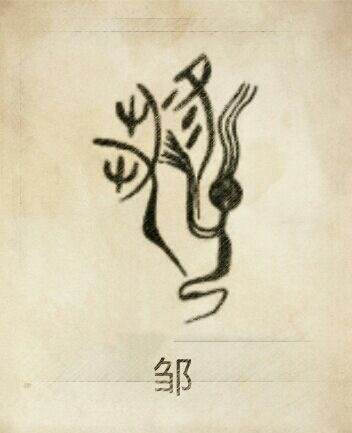The Zou(zōu) surname, deeply rooted in Chinese civilization, traces its origins back to ancient times. Its evolution reflects the unique charm of Chinese surname culture, transitioning from the name of an ancient kingdom to a modern cultural symbol. The Zou surname is not just a family identifier but also a vital vessel for the inheritance of Chinese civilization.

Ⅰ、Origins and Early Development of the Zou Surname
The Zou surname has multiple origins, each contributing to its rich history:
1. Take the country as the surname:
The oldest origin of the Zou surname is linked to Emperor Shun. During the Shang Dynasty, descendants of Emperor Shun established the Zou Kingdom (in present-day southeastern Zoucheng, Shandong). After the kingdom was annexed by the Qi state, its people adopted "Zou" as their surname.
2. From the Cao Clan:
During the early Western Zhou Dynasty, King Wu of Zhou enfeoffed Cao Xie, a descendant of Zhuanxu, with the Zhu Kingdom (also called Zhulou). During the Warring States period, Duke Mu of Lu renamed the Zhu Kingdom as the Zou Kingdom. After the Chu state conquered Zou, its people took "Zou" as their surname, forming the "Cao-originated Zou clan." This branch shares ancestry with the Zhu and Liao surnames.
3. Take the county as the surname: Descendants of Wei Ziqi, the elder brother of King Zhou of Shang, adopted "Zou" as their surname based on their fief in Zouyi (modern-day Zou County, Shandong).
4. Minority groups changing surnames:
Over time, some ethnic minorities adopted the Zou surname as part of their integration into Han Chinese culture.
Ⅱ、Historical Figures of the Zou Surname
The Zou surname boasts a rich history of notable figures in politics, literature, philosophy, and science:
Zou Yan: A renowned philosopher of the Warring States period, Zou Yan proposed the "Five Elements Theory," which significantly influenced Chinese philosophy and political thought.
Zou Ji: A famous statesman of the Qi state during the Warring States period, Zou Ji was known for his wisdom in advising rulers, as illustrated in the story "Zou Ji Advises King Qi."
Zou Yang: A Western Han Dynasty writer, Zou Yang is celebrated for his eloquent "Letter to Prince Liang from Prison."
Zou Hao: A Song Dynasty scholar and politician, Zou Hao was admired for his integrity and literary contributions.
Zou Shouyi: A Ming Dynasty philosopher and key figure in the Wang Yangming School, Zou Shouyi advocated for "innate knowledge" and promoted education through academies.
Zou Taofen: A modern journalist and publisher, Zou Taofen founded Life Weekly, which profoundly influenced Chinese society.
Zou Rong: A revolutionary thinker during the late Qing Dynasty, Zou Rong authored The Revolutionary Army, a pivotal text in the lead-up to the 1911 Revolution.
Zou Boqi: A Qing Dynasty scientist, Zou Boqi made significant contributions to astronomy and mathematics, particularly in geometric optics.
Ⅲ、Cultural Significance of the Zou Surname
Regional Prestige and Clan Halls:
1. Junwang (Regional Prestige): The Zou surname is closely associated with Fanyang (modern Zhuozhou, Hebei) and Donglu (Zoucheng, Shandong), representing its historical roots.
Tanghao (Clan Hall Names): The "Fanyang Hall" and "Donglu Hall" symbolize the Zou family's regional identity and cultural inheritance.
2. Family Teachings and Values:
The Zou clan emphasizes "loyalty, filial piety, and scholarly pursuits," reflecting Confucian ideals of moral integrity and education.
3. Literary and Artistic Contributions:
Zou literati have left an indelible mark on Chinese culture, from Zou Hao's poetry to Zou Rong's revolutionary writings and Zou Taofen's journalistic legacy.
Ⅳ、Social Impact of the Zou Surname
1. Migration and Distribution:
The Zou surname spread from Shandong during the Spring and Autumn period, reaching Jiangnan and Lingnan by the Tang and Song Dynasties. During the Ming and Qing Dynasties, it expanded to southwestern China and overseas. Today, the Zou surname is prevalent in Jiangxi, Hunan, and Sichuan, with significant overseas communities in Southeast Asia and North America.
2. Modern Influence:
The Zou surname continues to hold cultural and social significance. Figures like Zou Taofen and Zou Rong remain influential, embodying the values of integrity and progress.
Ⅴ、Conclusion
The history of the Zou surname is a microcosm of Chinese civilization's development. From its origins in ancient kingdoms to its role in shaping cultural and political landscapes, the Zou clan has left an enduring legacy. Its emphasis on loyalty, filial piety, and education continues to inspire generations. In the modern era, the Zou surname remains a vital part of Chinese cultural heritage, contributing to the inheritance and evolution of Chinese civilization.